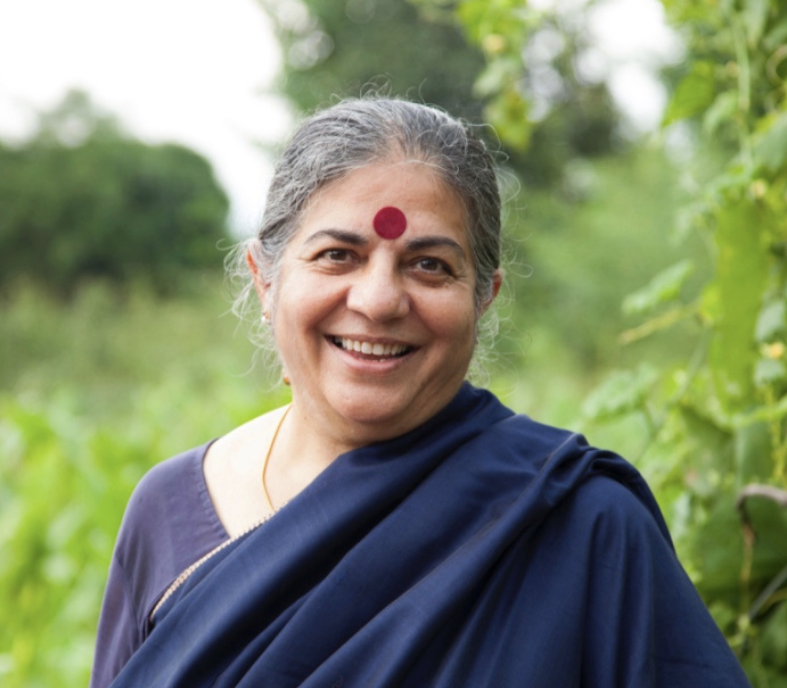In Conversation with Vandana Shiva
SEWA had a conversation with environmental activist and thinker Dr. Vandana Shiva on women’s collectives and climate action.


Women’s grassroots collective enterprises are creating economies based on needs and care, not greed; on cooperation, not competition; on diversity, not uniformity, on de-centralisation, not centralisation. These are the economies of the future.
Vandana Shiva
SEWA had a conversation with environmental activist and thinker Dr. Vandana Shiva on women’s collectives and climate action. Awarded with the Right Livelihood Award or the 'Alternative Nobel Prize' in 1993, Dr Shiva has extensively worked towards de-corporatizing agriculture, restoring food sovereignty and promoting a traditional seed culture through Navdanya, a movement for protecting biological and cultural diversity.
Q: What role can grassroots women's collective enterprises play in the mitigation of the climate disaster?
Dr. Shiva: The climate, health, inequality, poverty and hunger crises have their roots in corporate greed, profits and control. 10 billionaires now own more wealth than 40% of humanity. This is inhuman, not sustainable and unjust. Women’s grassroots collective enterprises are creating economies based on needs and care, not greed, on cooperation, not competition, on diversity, not uniformity and monocultures, on self determination, not external control, on decentralisation, not centralisation.
When true costs and true benefits are taken into account, women’s grassroots collective enterprises produce more while regenerating the earth and enhancing women’s potential. These are the economies of the future.
Q: You often talk about how women have the potential to lead the transition to regenerate the Earth and how their natural instinct for farming is that of growing food for health and not disease. Why do you say this?
Dr. Shiva: I do not refer to natural instincts. I am not an essentialist. Women have knowledge and skills for caring for the earth, the soil, the children because they were left to care for the basis of life, and care work was not considered work. The care economy was not considered an economy. Women’s work and knowledge was not counted. But the care economy is the foundation of all economies.
The transition to regenerate the earth needs women’s experience, knowledge, skills, values, worldviews. This includes the recognition that we are part of the earth, not separate from her. What we do to the earth, we do to ourselves. When we grow food with care for the earth and community , we grow healthy food. The health of the planet and our health is one health.
Q: Crises of any kind, including the climate crises, affect the marginalized more than anyone. It is often the economically disadvantaged, informal women workers that are the worst affected. We saw this during COVID-19. How can we be better prepared and make sure that we don't leave anyone behind?
Dr. Shiva: Climate resilience has both ecological and social dimensions. Uniform, long distance, centralise systems are more vulnerable to climate breakdown. Diverse, localised, decentralised systems bounce back more easily. Women bear the heaviest burden when climate disasters strike. But women also carry the knowledge and practices that create resilient systems. Women are central actors in responding to climate change. They should be climate action leaders.
Q: What is Ecofeminism and how is it the future according to you?
Dr. Shiva: Ecofeminism is the recognition that the Earth and women are creative and intelligent. Capitalist patriarchy created the illusions that nature is dead, raw materials are to be exploited and property to be owned. That women are passive, objects to be owned an manipulated. Capitalist patriarchy has unleashed ecocide and femicide. The non-violent creative partnership of women and nature can help humanity avert ecological collapse and extinction.
Contribute
Technology and social justice are complex topics that require a diversity of perspectives and contributions. Join the conversation by sharing your thoughts, questions, critiques, and relevant resources with us at info@datacommunities.ca.